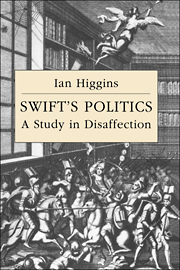Book contents
- Frontmatter
- Contents
- Preface
- List of abbreviations
- 1 Swift's political character
- 2 Revolution, reaction and literary representation: Swift's Jacobite Tory contexts
- 3 The politics of A Tale of a Tub
- 4 The politics of Gulliver's Travels
- Bibliography
- Index
- Cambridge Studies in Eighteenth-Century English Literature and Thought
2 - Revolution, reaction and literary representation: Swift's Jacobite Tory contexts
Published online by Cambridge University Press: 25 August 2009
- Frontmatter
- Contents
- Preface
- List of abbreviations
- 1 Swift's political character
- 2 Revolution, reaction and literary representation: Swift's Jacobite Tory contexts
- 3 The politics of A Tale of a Tub
- 4 The politics of Gulliver's Travels
- Bibliography
- Index
- Cambridge Studies in Eighteenth-Century English Literature and Thought
Summary
The corpus of Tory literature in print and manuscript in the first Age of Party is massive and heterogeneous. Scholarly studies exist on many well-known Tory writers, including, for example, John Arbuthnot, Mary Astell, Francis Atterbury, Tom Brown, Mary Caesar, Jeremy Collier, the newsletter-writer John Dyer, George Granville, Charles Leslie, Roger L'Estrange, Delarivière Manley, William Oldisworth, William Pittis and Ned Ward. There is a substantial critical literature exploring the Jacobite dimension in the later poetry, translations, prose and dramatic writing of John Dryden, who dominates the literature of the 1690s, and in the work of Alexander Pope and Samuel Johnson in the eighteenth century. This chapter explores aspects of the radical idiom of Jacobite Tory literary reaction to the Revolution of 1688–9 and the Williamite, Queen Anne and Hanoverian establishment. What is witnessed in Swift is a post-Revolution Toryism which combined High Church attitudes with a radical political critique of Whig establishment. Swift's imaginative texts are not without Jacobite implication and velleity.
A ‘Tory’ text might express certain characteristic commitments and hostilities: engagement for the rights, powers and privileges of the Church of England, support for the proscription of Dissent from public life, repudiation of latitudinarian politics, subscription to the doctrines of passive obedience and non-resistance (however modified), detestation of anti-monarchical principles identified with Whiggism, and animus against the naturalization of foreign Protestants and against the Dutch.
- Type
- Chapter
- Information
- Swift's PoliticsA Study in Disaffection, pp. 38 - 95Publisher: Cambridge University PressPrint publication year: 1994

